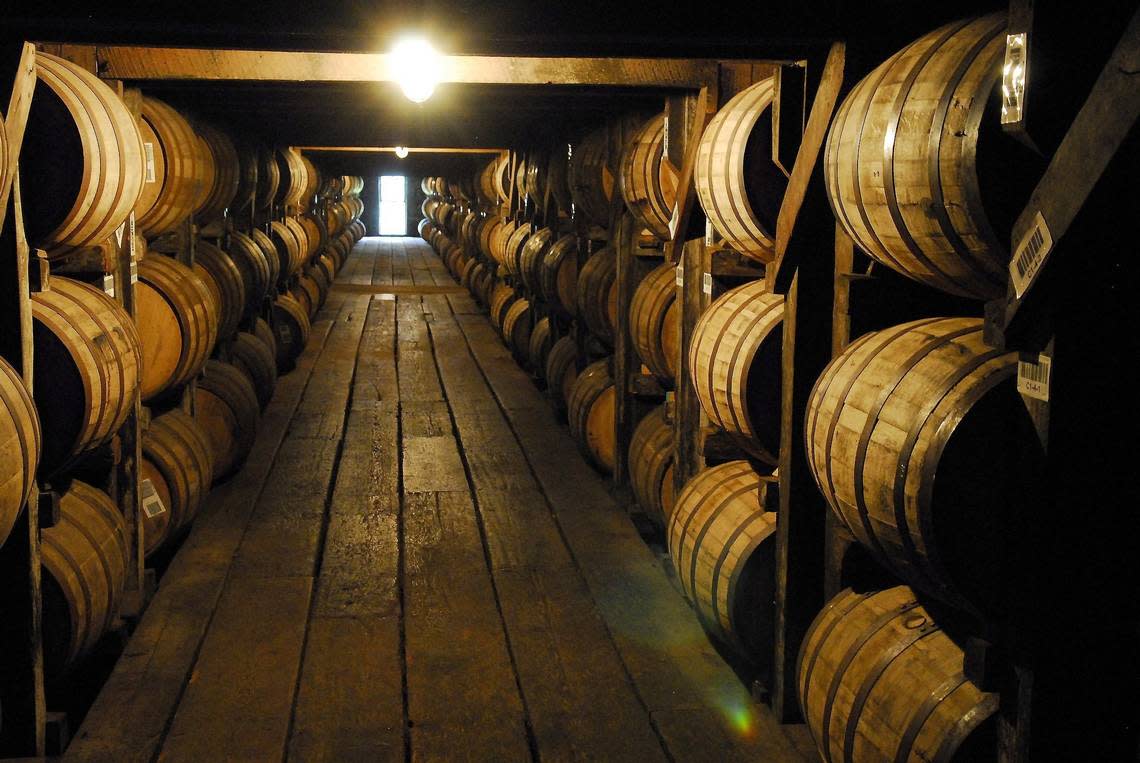‘Not elected by the distilleries.’ Bourbon barrel tax cut passes House despite pushback

Nelson County Sheriff Ramon Pineiroa asked the legislators of the House Appropriations & Revenue Committee on Monday to look at the Kentucky state flag behind them, specifically pointing out the two men in the center who are pictured shaking hands.
He said the tax on stored spirits known as the ‘bourbon barrel tax,’ which many officials who testified before the committee said was a lifeline for their local governments, was a handshake agreement between local communities and the bourbon industry.
He said House Bill 5 would break the promise of that handshake.
“When the bourbon came to our counties, they asked for the handshake and now they’re retracting that handshake. I request that you guys vote against House Bill 5 and honor that handshake,” Pineiroa said.
It passed committee and the House floor, with a strong majority of Republican support despite some bipartisan pushback, on Monday. The House passed the bill 58-41, with divisions taking place within the Democratic and Republican caucuses.
Many legislators hailing from bourbon-producing counties opposed the bill.
The legislation from House A&R Chair Jason Petrie, R-Elkton, seeks to phase out the tax by 2039 in the hopes of keeping the booming industry in Kentucky. The bill passed quickly through committee and then on the House floor on Monday, to the chagrin of many in those bourbon-producing communities.
Pineiroa’s county includes Bardstown, recognized by many as “the bourbon capital of the world.” Nelson County was projected to lose around $6.3 million total per year based on the first draft of the bill.
The total local revenue lost would diminish if House Bill 447, a companion bill from Petrie that aims to replace school board revenue losses with funds from the Budget Reserve Trust Fund, also known as the ‘Rainy Day Fund, passes into law. The House passed it in a near-unanimous vote.
Proponents of the legislation included Petrie and House Speaker David Osborne. Osborne said the tax will disincentivize current bourbon companies from leaving the state and encourage more start-up operations. Petrie concurred, citing the fact that Kentucky is the only state with such a tax on stored distilled spirits.
Andrew McNeil, former deputy state budget director and policy fellow at the Bluegrass Institute for Public Policy Solutions, argued that the tax needs to be eradicated because it’s “anti-competitive.”
“It’s an anti-competitive tax with serious long-term ramifications. No question: Kentucky remains and continues to be the dominant player in bourbon production. It would be short sighted, however, to base policy decisions on that fact when there are clear and visible threats to our position,” McNeil said. “... Other states are gunning for Kentucky.”
A fiscal note for the legislation indicates that local entities will lose more than $232 million during the 14-year phase-out period. Once completely phased out, local governmental bodies will lose out on about $46.2 million per year and the state will lose around $3.2 million per year.
Local officials joined Pineiroa in strong opposition to the bill in committee.
Nelson County Judge-Executive Tim Hutchinson expressed dismay at the legislature moving forward with the bill without having consulted many local leaders of bourbon-producing counties like his own.
“”Not one meeting have I been called to, and I’m sure the bourbon side has been to your office quite often… You’re elected by the people, you’re not elected by the distilleries,” Hutchins said.
Josh Ballard, a city commissioner from the small town of Loretto which is home to Maker’s Mark, also spoke harshly of the bill’s effect on local governments. He said the city’s budget would be cut by 60% once the phase-out is complete.
“Our city is undergoing a revitalization. We are adding sidewalks to our streets, upgrading our park and rebuilding our downtown. Our city outlook is bright… The passage of House Bill five takes that all away. Devastation is the only word to use,” Ballard said.
Even some stalwart bourbon industry supporters were moved by the arguments of local officials.
“For the very first time in my 21 years here I will be voting against the distilleries because I think… we’re taking a gamble,” Graham said.
With House passage, the bill moves on to the Senate.
